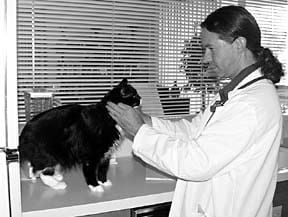By Shannon Wilkinson
Picture this: A friend comes over for a visit. She settles herself on your living room floor and plays with your dog. She talks to him and to you, offering him a few of his favorite treats. After 30-60 minutes of enjoying one another’s company, she leaves.
Your dog might not have realized it, but he just had a veterinary exam. And neither he, nor you, had to leave the comfort of your own home.
This is the kind of appointment you can expect when choosing one of the growing number of mobile, or housecall veterinarians. The American Association of Housecall Veterinarians says that membership in their organization has increased 150 percent over the last 10 years. It’s not hard to understand why.
“An animal is much more at home in his own environment. My clients are pleased with the whole situation,” says Rose DiLeva, DVM. Her practice, Animal Wellness Center in Chadds Ford, Pennsylvania, currently consists of about 30 percent housecalls. The animals she sees at a client’s home aren’t stressed out, there are no worries about the possibility of carsickness, plus she has the opportunity to see the animal’s day-to-day environment.
Comfort, convenience, and personalized service
It’s not uncommon for animals to show signs of stress or trauma at the veterinarian’s office. These kinds of reactions at a veterinary hospital can become a conditioned response. It doesn’t take many unpleasant experiences – sometimes just one – for a dog to generalize that the veterinary clinic, or a person in a white lab coat, is going to do something to him that he doesn’t like or causes pain.
In fact, it is not even necessary for a dog to have personally experienced a bad visit to the vet. As the American Association of Housecall Veterinarians explains on its Web site, some animals release pheromones related to fear and trauma. The vet clinic waiting room and the exam rooms are a veritable potpourri of these scents. When other animals detect the pheromones, a fear response may be triggered.
Of course, most veterinary clinics are populated with sick dogs, and, despite even the most assiduous cleaning and disinfecting routines, the hospitals expose dogs to an increased risk of contagious disease. Housecalls, then, offer a particularly desirable option for those who wish to limit their dog’s exposure to infectious agents, such as guardians who practice natural rearing methods and either don’t use vaccinations at all or limit their use significantly (particularly for well-puppy exams), or people whose dogs have a compromised immune system.
Anna Maria Gardner (née Anna Maria Scholey), DVM, of PetSynergy in Spokane, Washington, says that some of her clients choose housecalls because of mobility issues – either their own, or their dogs. She has elderly clients who don’t drive, or because of arthritis, have a difficult time handling their dogs on a trip to a clinic. Some of the dogs suffer from arthritis themselves, or may be too large to ride in the car comfortably. She even provides housecalls to a religious cloister whose members never leave the convent.
Convenience is another common motivator for housecall clients. They might have multiple animals or small children at home. When the vet comes to them, they do not have to load everyone in the car, arrange for childcare, or make separate appointments for each of their animals.
Considerations
There may be limitations to the services your housecall vet can provide. Some veterinarians have “clinics-on-wheels” and can provide every level of care and even perform surgery. Other vets who provide housecalls may limit their practice to different types of hands-on exams and complementary practices that don’t require much equipment. They may even choose to mail remedies or supplements so that they don’t have to carry a large inventory of products with them.
Dr. Gardner found it difficult to maintain a clinic when she was primarily doing housecalls and telephone consultations. The overhead and time required to keep up the administrative side of things and the facility itself took away from her ability to spend time with clients and their animals. She discontinued the office and went back to working with all patients either through housecalls or telephone consultations. Because of this, many of her clients maintain an additional veterinary relationship where the animal can be taken for bloodwork or other laboratory tests as needed. This vet can act as a backup in a more urgent situation as well.
Not all health situations are conducive to treatment at home. It is important to know exactly what kinds of treatments your housecall vet can provide. Dr. DiLeva started her housecall practice with a fully equipped mobile clinic. She could provide any service, including those requiring anesthesia for surgery, either in the client’s home or in her mobile clinic parked just outside.
After opening her office, Dr. DiLeva found the complete mobile clinic was redundant. Now her housecalls are for more simple exams and treatments such as acupuncture and herbs. She travels to these appointments with at least one assistant who helps her draw blood and facilitate the examinations.
A veterinary appointment at your home may even help solve a previously unresolved health or behavioral issue. Environment can be a crucial piece of the puzzle, and while most animal guardians attempt to convey all the information that is pertinent to their dogs’ cases, they may leave out something important. They may not recognize the significance of a detail, or may not even notice a particular situation. Sometimes when the veterinarian can actually see the dog’s environment, she can make a link that otherwise would be missed.
Dr. DiLeva discovered this with a six-month-old black Labrador puppy who was having seizures. While on a housecall to the family, Dr. DiLeva noticed that they lived in an older home that was undergoing renovation one room at a time. Near the puppy’s crate, areas of the wall had been chewed. This triggered a thought with her – perhaps the seizures were caused by lead poisoning.
In fact, blood testing did show that he had been exposed to toxic levels of lead. This discovery also led the family to test their child, who also showed excess blood lead levels. Dr. DiLeva was able to treat the puppy, and the family was able to take care of the environmental situation as well as their own health before a more significant impact was felt.
How to find your housecall vet
The best option for finding a vet that provides housecalls is a referral from a trusted source. Start asking around. Your local animal “health food store,” doggie daycare, or even the dog park are good places to begin.
You can also check the online listings of the American Association of Housecall Veterinarians. The organization lists member practitioners online (athomevet.org), but does not have a referring phone number or address. Keep in mind that this listing includes all types of veterinarians and does not delineate between those who practice holistic, alternative, and complementary modalities and those who use only conventional veterinary medicine.
It may be helpful to contact the veterinarians in your area who are listed with various holistically oriented organizations such as the American Holistic Veterinary Medical Association, the Academy for Veterinary Homeopathy, or the International Veterinary Acupuncture Society.
Be sure to find out all the particulars before making an appointment (see sidebar, below). When starting a new relationship, it’s always a good idea to reduce the possibility of unpleasant surprises.
Getting the most out of a housecall visit
After finding a veterinarian who provides the services you’re interested in, it’s time for your first appointment. The more preparation you do in advance, the more you can relax during the actual visit and focus on the health and well-being of your dog.
Remember that just like at the vet’s office, sometimes you will need to be flexible with scheduling. Dr. DiLeva schedules a 30-60 minute range of time rather than a set appointment time. “Weather, traffic or an unexpected treatment can affect the schedule,” she says. Know your vet’s policy on scheduling and allow for problems with traffic or emergency situations.
Determine how your dog behaves when visitors come to the house. Is he nervous or shy around newcomers? Or, conversely, if your dog has a tendency to be reactive or even aggressive around strangers in the home, perhaps housecalls aren’t the best option. Or, the vet may ask you to use a muzzle to ensure the safety of everyone involved. In any situation, it makes sense to have him contained in a safe and non-stressful manner.
“Don’t get in a confrontational situation to begin,” suggests Dr. Gardner. She has found avoiding a greeting at the door is very important with any type of dog. Containing the animals in a different area until she is in the house can decrease these types of problems. Once she is in the house and settled in the room where she’ll be working with the dog, then the dog can come in for his greeting. Many dogs will accept her presence and settle more quickly in this manner.
It can be distracting, disruptive to the doctor’s schedule, and just plain rude to keep a veterinarian waiting while you attend to other household matters during a housecall. Allow the answering machine to take phone messages, and make any communications with other household members as brief as possible during the vet visit.
Parents of small children may find that it is easier to supervise their kids with a veterinarian in their home than to bring the children with the pet to an animal hospital. However, parents should discuss the doctor’s visit with their children in advance, asking for the kids’ cooperation in not distracting them, the dog, or the doctor.
It can be very helpful to the veterinarian if you have thought about and prepared a great location for her to examine your dog. It should be a comfortable room for the dog, with plenty of light available for the vet. If the floor is slippery, you can use a rubber-backed bath mat to provide a soft, comfortable place for your dog to be examined. Practice having your dog lie on the rug and permit a brief mock examination, giving her lots of cookies and praise for her quiet compliance. This sort of preparation can save time when the vet arrives.
Also, prepare by writing down specific questions, problems, or issues, suggests Dr. Gardner. Just like when you actually go to the clinic it can be easy to forget some of your questions at a home visit. Often, it is even easier to become distracted at home than at the clinic. You are likely to get much more out of your visit if you are able to keep on track and focused.
At first glance, housecalls may seem more expensive than an office visit. Dr. DiLeva charges $44 for an office exam and $59 plus mileage for a housecall. Additional animals are seen on the same visit for a reduced fee.
While her housecall fee is higher than her office fee, there are other types of savings. You don’t have to spend time traveling to the appointment. In addition, there is the benefit of convenience and maybe saving your dog from undue stress, fear, or the possibility of carsickness. Plus, the entire appointment is spent with the vet personally, rather than with a tech or in the waiting room. You have the vet’s undivided attention once she is at your home for the appointment.
Also With This Article
Click here to view “When a Difficult Event – Euthanasia – Is Made Far More Difficult”
———–
Shannon Wilkinson is a TTouch practitioner who lives with two dogs, two cats, and a husband in Portland, Oregon.





